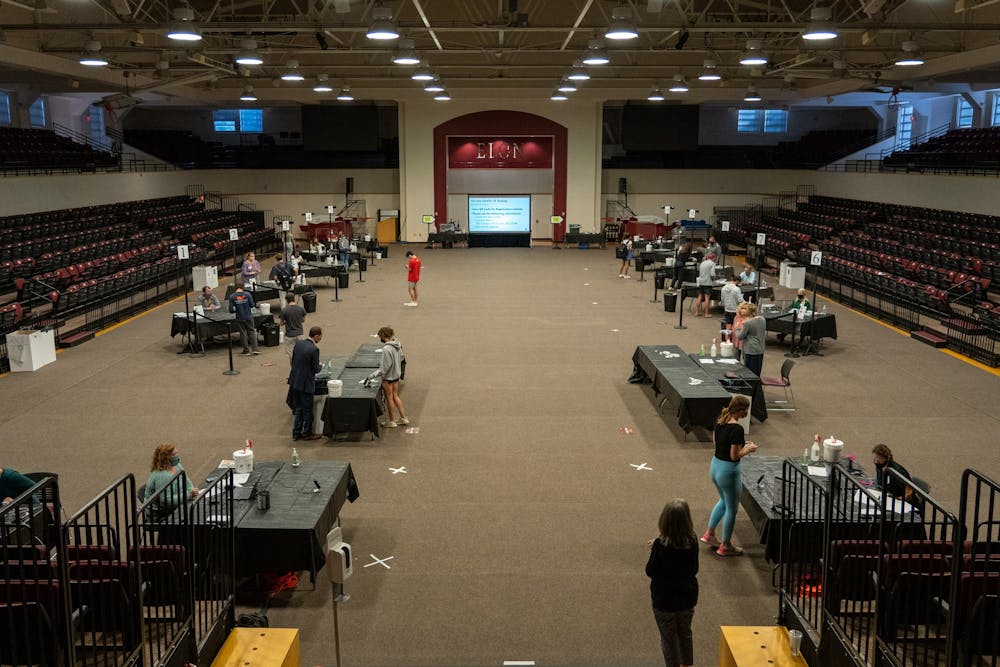Only a floor separates Elon University sophomore Chris Anderson and his friends. However, he said he feels like he cannot go visit them without breaking Elon’s “new mitigation measures” to prevent the spread COVID-19.
One of these restrictions include limiting informal social gatherings to five people or less, according to an email to the Elon community from Jeff Stein, chair of the Ready & Resilient committee. This comes after two spikes in COVID-19 case numbers on Friday, Oct. 24, and Saturday, Oct. 25 — in the last five day, cases have totaled.
The university is also testing 5,000 students over the next week. These restrictions are being combined with measures already in place under a social hiatus — the second one implemented this year — which began Oct. 23. These restrictions include grab-and-go dining and suspending practice for high-risk club sports.
“I think it is kinda stupid,” Anderson said. “I can’t even go downstairs and hang out with my friends, and then I see a ton of people at Paulie’s.”
Anger is what senior Kyra Letsinger felt after seeing the spike in the school’s COVID-19 case numbers. She said most of that anger was directed at the Elon administration.
“I was upset. Not just sad, but angry at everybody that caused it to happen, especially in the school, to be honest,” Letsinger said.
Her opinion differs from Anderson’s in that she is frustrated because she never thought students should have returned to campus here in the first place.
Letsinger tested positive for COVID-19 this summer and she said her experience was “horrible.” She shared her thoughts on having the semester in-person with Vice President for Student Life Jon Dooley.
“The school knew that this was going to happen and there was no way for them to say that they hadn’t,” Letsinger said. “So many people told them it was, including me.I told Jon Dooley, ‘I have been through this’ and people aren’t going to deal well with it. It is going to be awful.”
Letsinger believes that through their emails, the university is blaming students for the spike in cases.
“There’s just always this idea that, ‘we trust our students’ and then they turn right back around and they’re like, ‘we are ashamed of the student body for not following safety procedures,’” Letsinger said.
Letsinger said she found a part of one of Stein’s emails was “patronizing.”
“These numbers are extremely concerning and show how isolated cases spread through social contact can impact entire groups,” Stein wrote in the email Letsinger was referencing to. “There are important lessons to learn here: If you are in a social or residential group, NOW is the time to reflect on the nature of your shared activities. Wearing a mask, physically distancing, and limiting contacts are the best tools to mitigate virus spread.”
However, Letsinger does think students are also to blame as well.
“I’m angry at my peers for not caring,” Letsinger said.
The university has identified eight total clusters. Five of those were greek life organizations and the remaining were in on-campus housing. One of the clusters found has been tied to an event, according to Dan Anderson, a member of the Ready & Resilient committee and vice president of university communications. Anderson
Letsinger supports the current social hiatus, but according to her “it doesn’t feel” like we are on one. One of her worries were events happening around campus.
“I don’t know how intensely things are going to be enforced.” Letsinger said referring to neighbor activities.
She is worried about activities on campus because off campus she believes “things aren’t being enforced.” The university has not increased enforcement measures off campus since the announcement of the social hiatus.
“We’re not going to make sure anything happens,” Anderson said. “We’re asking people to comply with this.”
Sophomore Stephanie Miljanic thinks activities like outdoor movie nights should be happening.
Miljanic is involved in planning a movie night on Global Neighborhood’s quad, which is scheduled to take place on Oct. 29. They intend to show the movie Hocus Pocus and have provided like individually wrapped popcorn bags. Currently, she is worried about it getting canceled.
Mijilanic thinks not having events like these could cause students to party more.
“Making it so there are no activities whatsoever on campus, it’s kind of ridiculous,” Miljanic said. “This weekend, there was nothing going on, which kind of makes kids feel like they need to party.”
Miljanic instead feels as though the university should be doing more “fun” and “safe” activities.
“I would do a lot more social events, whether that be virtual or in-person,” Miljanic said. “ A few weeks ago, when we first went into level three, there was a concert right outside Global, it was so much fun.”
Since going into Level 3 — High Alert, events like the Election Day watch party on Nov. 3 in the Moseley Student Center have been canceled.
Both Letsinger and Miljanic wish student’s voices were included more in making decisions for students. Letsinger mentioned that she knew student body president Robbie Miley was part of the Ready and Resilient committee, but she hoped for more of a student voice.
“I wish there had been more student voices when these decisions were being made over the summer,” Letsinger said. “I know Robbie Miley was on the Ready and Resilient committee over the summer, but he was the only one.Have students in the room for those big decisions because we’re the ones who are having to go through everything.”
—
Margaret Faust and Isabel Gouveia contributed to the reporting of this story.


